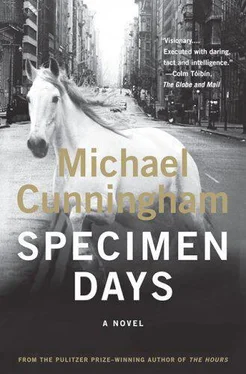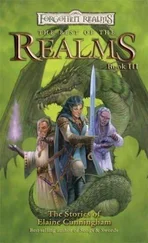Michael Cunningham - Specimen Days
Здесь есть возможность читать онлайн «Michael Cunningham - Specimen Days» — ознакомительный отрывок электронной книги совершенно бесплатно, а после прочтения отрывка купить полную версию. В некоторых случаях можно слушать аудио, скачать через торрент в формате fb2 и присутствует краткое содержание. Город: New York, Год выпуска: 2005, ISBN: 2005, Издательство: Farrar, Straus and Giroux, Жанр: Современная проза, на английском языке. Описание произведения, (предисловие) а так же отзывы посетителей доступны на портале библиотеки ЛибКат.
- Название:Specimen Days
- Автор:
- Издательство:Farrar, Straus and Giroux
- Жанр:
- Год:2005
- Город:New York
- ISBN:0-374-70515-1
- Рейтинг книги:4 / 5. Голосов: 1
-
Избранное:Добавить в избранное
- Отзывы:
-
Ваша оценка:
- 80
- 1
- 2
- 3
- 4
- 5
Specimen Days: краткое содержание, описание и аннотация
Предлагаем к чтению аннотацию, описание, краткое содержание или предисловие (зависит от того, что написал сам автор книги «Specimen Days»). Если вы не нашли необходимую информацию о книге — напишите в комментариях, мы постараемся отыскать её.
Specimen Days — читать онлайн ознакомительный отрывок
Ниже представлен текст книги, разбитый по страницам. Система сохранения места последней прочитанной страницы, позволяет с удобством читать онлайн бесплатно книгу «Specimen Days», без необходимости каждый раз заново искать на чём Вы остановились. Поставьте закладку, и сможете в любой момент перейти на страницу, на которой закончили чтение.
Интервал:
Закладка:
“Why are you doing this?” Cat asked.
The woman sighed and tucked an errant strand of ghost-white hair behind her ear. She could have been an elderly professor, fatigued by her students’ youth and opacity but still hopeful, still willing to explain.
“Look around,” she said. “Do you see happiness? Do you see joy? Americans have never been this prosperous, people have never been this safe. They’ve never lived so long, in such good health, ever, in the whole of history. To someone a hundred years ago, as recently as that, this world would seem like heaven itself. We can fly. Our teeth don’t rot. Our children aren’t a little feverish one moment and dead the next. There’s no dung in the milk. There’s milk, as much as we want. The church can’t roast us alive over minor differences of opinion. The elders can’t stone us to death because we might have committed adultery. Our crops never fail. We can eat raw fish in the middle of the desert, if we want to. And look at us. We’re so obese we need bigger cemetery plots. Our ten-year-olds are doing heroin, or they’re murdering eight-year-olds, or both. We’re getting divorced faster than we’re getting married. Everything we eat has to be sealed because if it wasn’t, somebody would put poison in it, and if they couldn’t get poison, they’d put pins in it. A tenth of us are in jail, and we can’t build the new ones fast enough. We’re bombing other countries simply because they make us nervous, and most of us not only couldn’t find those countries on a map, we couldn’t tell you which continent they’re on. Traces of the fire retardant we put in upholstery and carpeting are starting to turn up in women’s breast milk. So tell me. Would you say this is working out? Does this seem to you like a story that wants to continue?”
Portly said, “Yeah, but you still can’t beat a Big Mac.” He cleaned a fingernail with an opposing thumbnail.
“And you think you can do something about it?” Cat asked.
“One does what one can. I’m part of the plan to tell people that it’s all over. No more sucking the life out of the rest of the world so that a small percentage of the population can live comfortably. It’s a big project, I grant you. But history is always changed by a small band of very determined people.”
This got Portly interested again. He said, “Who are you working with?”
“We don’t see one another as much as we’d like to,” the woman said.
“Give me a name.”
“We don’t have names.”
“You call yourself Walt,” Portly said.
“The boys call me that. I don’t know how it started, really, but it seemed to comfort them, so I allowed it. You know how children are.”
“What’s your real name?” Portly asked.
“I don’t have one. Really, I don’t. They gave me one, many years ago, but I hardly remember it anymore. It isn’t mine. It never was.”
“You’re in the family,” Cat said.
“Why, yes, dear. I am. We all are, don’t you see?”
“What do you mean by that?” Cat asked. “Whose family?”
“Oh, you know.”
“I don’t know. I’d like you to tell me.”
“You’ll forget your false name, in time.”
“Do you work for the company?” Cat asked.
“We all work for the company. It’s going out of business, though.”
“Tell me about the company.”
“I’m afraid I’m all talked out now. I really don’t have anything more to say.”
Something happened to her eyes. They went glassy, like the eyes taxidermists put in the sockets of dead animals.
“Walt?” Cat said.
Nothing. The woman sat with her hands splayed out on the tabletop, looking blindly at the air directly in front of her prim pink face.
Pete called fewer than twenty minutes later, on Cat’s cell.
“Did you find him?” she asked.
“No. There’s nobody. I think you should come over here. Have a patrolman bring you.”
“I’m on my way.”
The building on Rivington was one of the last of the old wrecks, sandwiched between a skateboard store and a wine bar. It was scabby brown plaster, chalky, like very old candy. Across the street a converted warehouse, its bricks brightly sandblasted, flew a green banner that announced the imminent availability of The Ironworks Condominium Luxury Lofts.
The galvanized steel door, which said DETHRULZ and PREY FOR PILLS in bright, dripping letters, was open. Cat went in. The door led onto a scarred yellow hallway illuminated by a buzzing fluorescent circle. Desolation Row. And yet, someone had put a vase full of artificial flowers on a rickety gilded table just inside the vestibule. Gray daisies and spiky wax roses and, hovering over the flowers, impaled on the end of a long plastic stick, a desiccated angel made of plastic and yarn.
Cat went up the stairs, found the door to apartment nineteen. It was open.
Inside, Pete and Scary and the guys from the bomb squad stood in the middle of a small, dim room. Cat paused, getting her bearings. The room was neat. No clutter. It smelled of varnish and, faintly, of gas. There was an old beige sofa, a little like the one in her own apartment. There were a couple of mismatched chairs, a table, all chipped and scarred but presentable, surely found on the streets. And every surface except for the furniture was covered with pages, carefully aligned, yellowish under coats of shellac.
The walls, ceiling, and floor were covered with the pages of Leaves of Grass.
“Motherfuck,” Cat said. “Motherfuck,” Pete agreed.
“What do you make of this?” Scary said.
Cat walked slowly around the room. It was all Whitman.
“It’s home,” she said. “It’s where the boys grew up.”
At the room’s far end, an arched opening led into a short hallway. It, too, was covered in pages. She gave herself a tour.
Kitchen, bathroom, two bedrooms, lit by bare bulbs screwed into ceiling sockets. The bulbs were low-watt, probably fifteens they emitted a dim and watery illumination. The wan light and the varnish that covered the pages on the walls made it all sepia, insubstantial, as if she were walking through old photographs of rooms. The place was snug, in its insane and barren way. The kitchen was more presentable than hers. Pans, battered but clean, hung from hooks over the stove. On the countertop, a Folgers coffee can held silverware. In the first bedroom were three cots side by side, each scrupulously made up, their dust-colored blankets tucked in, an ivory-colored pillow centered at each one’s head. Blue plastic milk crates contained modest stacks of clothes. In the second bedroom was another cot, just like the others. The second bedroom also contained an old sewing machine, the treadle kind, glossy black, insectlike, on an oak stand.
It might have been the low-budget version of an army barracks or an orphanage. Except of course for the fact that everything the kitchen cabinets, the windows was plastered over with pages.
“She’s kept them here,” Cat said to Pete. “Who?”
“The boys. She got them as infants and raised them here.”
“You’re shitting me.”
“She brought up a family of little killers. She got custody of kids nobody wanted and brought them here. She’s been planning this for years.”
“You sure about that?”
“I’m not sure about anything.”
“You got any ideas as to why?”
“What do you think endures? Do you think a great city endures?”
“Say what?”
“According to her, it’s the end of days. The innocents are rising up.”
“Crazy.”
“Mm-hm. Entirely crazy.”
“Her prints aren’t matching up with anything in the files yet.”
“They won’t. She’s nobody. She’s from nowhere.”
“You’re starting to sound a little like her.”
Читать дальшеИнтервал:
Закладка:
Похожие книги на «Specimen Days»
Представляем Вашему вниманию похожие книги на «Specimen Days» списком для выбора. Мы отобрали схожую по названию и смыслу литературу в надежде предоставить читателям больше вариантов отыскать новые, интересные, ещё непрочитанные произведения.
Обсуждение, отзывы о книге «Specimen Days» и просто собственные мнения читателей. Оставьте ваши комментарии, напишите, что Вы думаете о произведении, его смысле или главных героях. Укажите что конкретно понравилось, а что нет, и почему Вы так считаете.












